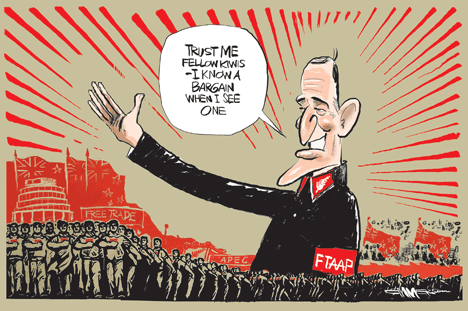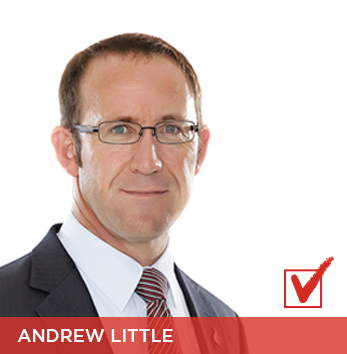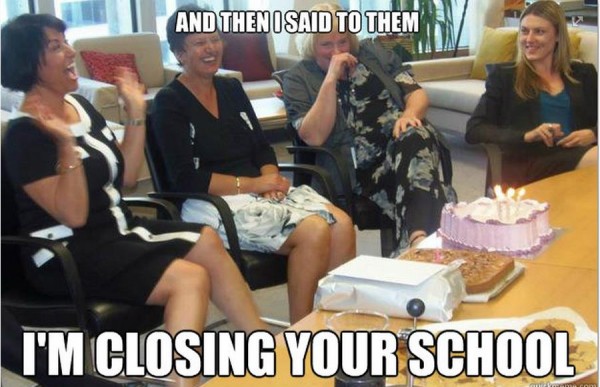Welcome to your new landlord – why we need Renter Rights now
Meet your new slumlord…
Young landlord’s 11 rentals in 5 years
Gary Lin says he started buying houses only so he could play World of Warcraft on his computer all day every day.Now he’s a multimillionaire who owns 11 rental properties in the soaring Auckland market.
The 32-year-old – originally from Guangzhou in China but a New Zealand resident since he was 13 – started buying property in June 2010 with a $200,000 wedding gift from his father. He and his wife Cindy bought one place for as little as $173,000.
Now his portfolio is valued at $6.5 million, which earns about $275,000 in gross rent each year.
Mr Lin, who drives a 2001 Honda, says he’s not motivated by the trappings of wealth. With his wife, he supports most of the living expenses of their parents and pays for the upkeep of five cars in two families.
The optimist says he isn’t worried by talk of a slump in property prices, saying that would only enable him to buy more places.
And like other Auckland landlords who predicted rent rises this week, he says he’ll be putting his rents up soon.
…and here’s this slumlord at his worst when justifying squeezing more money out his tenants…
“A tenant will have 20 bucks less, perhaps. But which business in the world actually subsidises their customers?”
…what a vicious little Young Nat he is. Lin isn’t the first slumlord to make the headlines, there was this repugnant arsehole…
$18m landlord who owns 37 properties: Don’t be too kind to your tenants
“The kinder a landlord is to a tenant, the worse the tenant treats the landlord. Some tenants go to great lengths to become friends with their landlord, then come up with all manner of hard-luck stories and expect their landlord friend to help them out financially by letting them off paying their rent,” Mr Goodwin said.
…the entitlement and privilege of this boomer slumlord is just appalling.
News that a Chinese Billionaire is trying to buy up NZs State Housing should terrify state tenants.
Slumlords like Lin and Goodwin represent the worst malfunctions of the market laid bare.
Renters need rights and they need them now.
We require new law cementing in long term tenancies with rent controls and the promotion of ‘ethical landlords’, people who refuse to squeeze every last drop of money out of their tenants for needless greed.
Our social inequality demands solutions, renters rights and affordable housing is part of that solution. Privileged arseholes like Lin and Goodwin represent all that is wrong with the current free market failures.
The Mendacities of Mr Key # 15: John Key lies to NZ on consultation and ratification of TPPA
.

.
As this blogger reported last year, on 16 June;
In the ongoing debate on the Trans Pacific Partnership Agreement negotiations, Dear Leader John Key has been at pains to try to reassure New Zealanders that any TPPA document would be “first presented to Parliament”.
“With all [free trade agreements] the way that they work is that have to be ratified by Parliament, and we have to build a parliamentary majority, and all of that has to happen through the transparency of the deal.”
“…my advice is that the Trans-Pacific Partnership will require legislation, so, ultimately, once it has gone through the select committee and the public have had their chance to have input, and it has gone through all of those various stages, the Government of the day will require a parliamentary mandate, so by definition people would have had a lot of input.”
And on 31st March this year, Key asserted on NewstalkZB;
“In the end, this thing has to go through our Parliament has to be ratified by our Parliament and has to bear scrutiny and I believe is in the best interests of New Zealand.”
At every opportunity, our esteemed Dear Leader and other National MPs and Ministers have been eager to assure New Zealanders that the text of the TPPA would be submitted to a select committee; scrutinised, and ratified by Parliament before it was signed.
Key’s assurances were seemingly air-tight. (Though I, for one, am always skeptical of any assertion made by our esteemed Dear Leader.)
However, a media statement from Chile’s General Directorate of International Economic Relations head, Andrés Rebolledo Smitmans, has seemingly given the game away. On 5 January, Smitmans stated;
“En la oportunidad expuso en primer lugar sobre el contexto en que se desarrolló la negociación de este tratado, que será firmado el próximo 4 de febrero en Nueva Zelanda.”
Google translation;
“At the time I first spoke about the context in which the negotiation of this treaty, to be signed on February 4 was developed in New Zealand.”
Also, according to Bloomberg the impending signing-ceremony is confirmed by the Peruvians;
Peru’s Trade and Tourism Ministry (Mincetur) confirmed that Deputy Trade Minister Edgar Vasquez, the country’s TPP negotiator, will be on hand for the signing ceremony in New Zealand.
And the Mexican financial periodical, El Financiero, reported;
“Los 12 países integrantes del Acuerdo Estratégico Transpacífico de Asociación Económica ( TPP , por sus siglas en inglés), firmarán el documento el próximo 4 de febrero en Nueva Zelanda, informó el secretario de Economía, Ildefonso Guajardo.”
Google translation;
“The 12 member countries of the Trans-Pacific Strategic Economic Partnership Agreement (TPP, for its acronym in English), [will] sign[ed] the document on February 4 in New Zealand, the Minister of Economy, Ildefonso Guajardo said.”
The fourth of February is five days before Parliament resumes sitting, on 9 February.
Which makes a lie out of Key’s promises that the TPPA would be put before the House for Select Committee scrutiny and Parliamentary over-sight. By the time Parliament resumes, the TPPA will have been ratified by all participants according to the Chileans, Mexicans, and Peruvians.
Evidently someone forgot to mention to our South American friends not to reveal the up-to-now-secret ratification date, leaving Simon Bridges to do some fast-explaining;
“Arrangements for the signing of the Trans Pacific Partnership are not yet confirmed, as a number of countries are still working through their domestic approval processes required before signature.
Further details will be announced when and if they are confirmed.”
National’s media spin-doctors must still be on leave if that statement is the best damage-control they can come up with.
It is clear that National was planning on “pulling a swiftie” by keeping the ratification date secret from the public – a point not lost on University Law professor and TPPA-critic, Jane Kelsey;
“Consistent with the government’s obsessively secrecy throughout the TPPA process, we have to get confirmation of what is happening in our own country from offshore.
Polls have shown the government doesn’t have popular support for the deal. Presumably it wants to limit the chance for New Zealanders to make their opposition heard. We were reliably told by offshore sources some time ago that the meeting is in Auckland, but we expect the government to try to keep the actual venue secret until much closer to the day.”
National has (again) been caught attempting to deceive the public.
It beggars belief that they really thought no one would notice.
It is now up to other political parties – Labour, Greens, NZ First, Maori Party, and Peter Dunne – not to support any enabling legislation put to Parliament on this trade deal. Otherwise they risk being associated with, and tarred, by a political process that has been uncovered to be patently dishonest.
Any government that has to employ deception to enact policy is afraid of it’s own people. National is not fit to govern.
.
.
.
References
TV3: Key accused of spreading TPPA ‘mistruths’
Parliament: Questions for Oral Answer — Questions to Ministers
NewstalkZB: Key defends TPPA negotiations
Dirección General de Relaciones Económicas Internacionales: Direcon expuso sobre el TPP en el Instituto Nacional de Derechos Humanos (INDH)
Parliament: House sitting programme
Bloomberg: TPP Countries to Sign Trade Pact in New Zealand Feb. 4
TV3 News: TPPA to be signed in NZ – report
El Financiero: TPP se firmará el 4 de febrero en Nueva Zelanda
Scoop media: Ministers to sign TPPA in NZ on 4 February 2016
Additional
Salon.com: The 10 biggest lies you’ve been told about the Trans-Pacific Partnership (Note point 5 in this article)
Previous related blogposts
Some thoughts on the Plain Packaging Bill
Public opposition grows against TPPA – Wellington
Public opposition grows against TPPA – Wellington
Even Tim Groser was in the dark?!
The Mendacities of Mr Key # 14: The TPPA – “We’ve never, ever been sued”
.
.
.

.
.
= fs =
What Labour are REALLY saying when they say they will defy the TPPA in Government
Andrew Little has come out today and stated that when in Government, Labour would simply defy the TPPA.
Hmmm.
So he’s saying that once in Government , Labour would pass law regardless of the TPPA and fight Corporates in a Court that is ruled by contract law and not the Courts of NZ?
That’s what Labour will do?
Spend hundreds of millions to fight corporations in a Court that focuses only on contract law?
That’s a solution?
If Labour are too timid to rule out giving Key support in Parliament when the show vote happens, are they really going to go up against huge trans-national corporations?
Let’s hope so.
EXCLUSIVE: Chinese billionaire lines up to buy state houses
Chinese property billionaire Dr Henry Cheng Kar-Shun has joined Australian-based Horizon Housing as the second foreign investor wanting to buy state houses from the government.
The government intends to sell up to a third of all state houses, the biggest privatisation of state assets in New Zealand history, beginning with 1140 houses in Tauranga and 370 in Invercargill. New Zealand state houses are valued at around $17 billion.
SHAN understands that on 11 December last year Social Housing Minister Paula Bennett met with Roger O’Sullivan, recently appointed New Zealand Manager for Dr Cheng’s Pinnacle Group to discuss buying state houses.
The Group sees rich pickings to be made from vulnerable state house tenants through “very exciting market opportunities” provided by the government.
Dr Cheng’s Pinnacle Group website explains it like this:
“Our current focus is on New Zealand where we have been shortlisted for Auckland City Council’s ‘Housing for Older Persons’ Project. Additionally, we are actively engaging in market soundings on Tamaki Regeneration and Tauranga Stock Transfer projects. New Zealand is providing very exciting market opportunities as the Government seeks innovative and transformative reform of the way social housing is managed and tenants supported.”
As we have done with Horizon Housing, SHAN has written to Dr Cheng expressing our strong opposition to any purchaser, domestic or overseas, buying state houses.
“The government selloff of state housing is a travesty. New Zealand needs more state housing, not less. We are in the middle of a housing crisis for low and middle income New Zealanders and only the government has the resources and the capacity to provide the large number of quality, affordable housing so desperately needed.”
We condemn this government policy to sell or transfer state houses as the most despicable move yet under John Key’s leadership. It is unworthy of even a National Party government.
TheDailyBlog.nz Top 5 News Headlines Friday 8th January 2016
5:
Nuclear weapons risk greater than in cold war, says ex-Pentagon chief
The risks of a nuclear catastrophe – in a regional war, terrorist attack, by accident or miscalculation – is greater than it was during the cold war and rising, a former US defence secretary has said.
William Perry, who served at the Pentagon from 1994 to 1997, made his comments a few hours before North Korea’s nuclear test on Wednesday, and listed Pyongyang’s aggressive atomic weapons programme as one of the global risk factors.
He also said progress made after the fall of the Soviet Union to reduce the chance of a nuclear exchange between the US and Russia was now unravelling.
“The probability of a nuclear calamity is higher today, I believe, that it was during the cold war,” Perry said. “A new danger has been rising in the past three years and that is the possibility there might be a nuclear exchange between the United States and Russia … brought about by a substantial miscalculation, a false alarm.”
The Guardian
4:
China suspends mechanism aimed at ending stock market turmoil
Chinese authorities sought to bring an end to new year stock market turmoil with a dramatic U-turn on a new mechanism that Beijing had hoped would prevent sharp selloffs.
On Thursday, in a tacit admission that the new circuit breakers introduced only this week were having the opposite effect to that intended, China’s main stock exchanges said they were suspending the mechanism. The move came after the breaker was tripped for the second time in a week as the market fell 7% within half an hour of opening.
China’s plunging share prices and the country’s moves to guide its yuan currency lower sent shockwaves around already jittery global markets and, in a dramatic day of trading, £30bn was wiped off the FTSE 100 and oil prices hit fresh multiyear lows. As the UK chancellor, George Osborne, warned against complacency over the recovery, the pound tumbled to a five and a half year low against the dollar.
The Guardian
3:
A Record Amount of US Forest Went up in Flames Last Year
Wildfires across the United States blackened more than 10 million acres of land in 2015, a new record set amid an intense drought across the West, the US Department of Agriculture reported this week.
Those blazes destroyed more than 4,500 buildings, and 13 firefighters died battling them, Agriculture Secretary Tom Vilsack said. Government agencies burned more than $2.6 billion on firefighting costs, which consumed more than half of the US Forest Service’s budget and forced the agency to shift money away from conservation and restoration projects aimed at preventing future fires, he said.
“We take our job to protect the public seriously, and recently, the job has become increasingly difficult due to the effects of climate change, chronic droughts, and a constrained budget environment in Washington,” Vilsack said in a written statement.
Vice News
2:
Iran accuses Saudi Arabia of Yemen embassy air strike
Iran has accused the Saudi-led coaliton of an air strike on its embassy in the Yemeni capital Sanaa amid rising tensions between Tehran and Riyadh.
Iran’s foreign ministry said on Thursday that Saudi jets “deliberately” struck its embassy in an air raid that injured staff.
“This deliberate action by Saudi Arabia is a violation of all international conventions that protect diplomatic missions,” foreign ministry spokesman Hossein Jaber Ansari was quoted as saying by state television.
Aljazeera
1:
Govt denies Chilean claim about TPPA signing
Duty minister Simon Bridges said despite an official statement by the Chilean government that the controversial trade deal will be signed on 4 February in New Zealand, arrangements are not yet confirmed.
The statement, issued by Chile’s General Directorate of International Economic Relations head Andrés Rebolledo Smitmans, said the agreement would be signed by ministers from the 12 countries that negotiated the deal.
The announcement sparked criticism from opponents of the deal, who said the fact the public only learned about the signing from overseas reports showed the government was still trying to limit the chance for New Zealanders to make their opposition heard.
Labour Party leader Andrew Little said it would be insulting to New Zealanders if the Trans Pacific Trade Agreement was signed in this country two days before Waitangi Day.
RNZ
Poverty denial & legalised incest – Why Jamie Whyte’s column isn’t about plagiarism
Pointing our Whyte rehashed previous arguments is as petty as his own argument – the issue is the poverty denial not his repetition of it. If you think catching him out saying the same thing he said a decade ago is a ‘win’ you need to redefine how you play the game.
Whyte denies poverty exists in NZ because his right wing philosophy demands individual responsibility and ignores hegemonic structures of control in society. He argues that poverty is relative, so if you have a TV and a fridge in NZ, then you aren’t really poor, hence claiming 305 000 children live in poverty is a lie.
He then goes into a ridiculous example of boys paid the same amount of money to arrive at his conclusion with the same disconnected academic approach that made his legalisation of incest such a winner.
The entire thread of his argument is an exercise in sophistry. All Whyte is doing is redefining poverty as ‘absolute’ and because few NZers fall into ‘absolute’ poverty there is no such thing as poverty. This is of course 100% pure grade bullshit. Poverty exists and it is deeply damaging the fabric of NZ society, allowing it to be defined in absolute terms spits in the face of those NZers struggling to make ends meet each week. The focus should be on stamping out Whyte’s damaging ideas, not bitching that he wrote the same argument almost a decade ago.
By focusing on his self-plagerism, we allow his argument to stand.
TPPA to be signed 4th Feb – is it time to riot or protest?
No discussion, no debate, no democratic dialogue – Key is going to try and ram the TPPA through and has the audacity to bring the global corporate overlords behind the TPPA to Auckland to sign it.
Our resistance to date has been focused on protest. If we are serious about protecting NZs economic sovereignty, maybe we need to recognise protest now must become civil disobedience if we are to shut this down.
And shut it down we must.
It is most likely going to be signed at SkyCity – now is the time to plan, plot and organise to shut this down. If this deal gets signed there is no point voting in any election after it as we will effectively be a sub state, not a nation.
Waitangi Day 2016 will be worthless if the TPPA is signed – every single believer in our sovereignty must converge on Auckland on the 4th to shut this down.
The time for confrontation is now.
Has anyone in the NZ media or Government noticed that China just fell another 7% in stockmarket meltdown?
30 minutes after opening, the Chinese Stock Market collapses another 7%…
China’s entire equity market was shuttered within half an hour of opening after falling 7 per cent on further currency weakness as government rescue efforts failed to deter the tide of sellers.
China’s stock market meltdown and currency depreciation have spooked international investors in a replay of last summer’s rout that reverberated around the globe. So far this year — just four days — the bluechip CSI 300 index is down 12 per cent.
Newly minted circuit breakers, introduced and first tripped on Monday, kicked in again on Thursday after the CSI 300 fell 7 per cent. Trading was halted for 15 minutes after the index lost 5 per cent, but as stocks continued to fall the full-day closure was triggered.
Investors were rattled by further weakening of the renminbi, said Wang Jun, analyst at China Securities Co in Beijing. “It was a panicked response to the forex market,” he said. “Accelerating exchange-rate depreciation could lead to liquidity problems. Valuations can’t help but take a pounding.”
The renminbi fell to its weakest level in nearly five years on Thursday, with capital outflow pressure still heavy even after more than a year of nearly uninterrupted outflows. The renminbi was 0.6 per cent weaker on Thursday morning at 6.5928 per US dollar after falling by roughly the same amount on Wednesday.
Policymakers appear uncertain about whether to wade back in to buy stocks with state funds or to stand back. On Tuesday, the “national team” of state-owned financial institutions appeared to re-enter the stock market after remaining on the sidelines since late August.
…so much for the billions they dropped to keep it afloat – it’s a nightmare. We have a Government who have put all our economic cows in one Beijing paddock and we have a mainstream media utterly asleep at the wheel who are currently focusing on celebrity pets, TV3 bums and Jamie Whyte telling us there is no poverty in NZ.
It’s like no one is either watching the news or they have no bloody comprehension what is happening! We are witnessing a slow motion global crash that could herald in a depression unlike anything we’ve witnessed. All of this links back to the first GFC in 2007/2008 and the black swans are all coming home to roost flying first class.
Can someone please wake the Government up or at the very least sack the holiday journalists running the news rooms. NZers are going to wake up to an economy in ruins before they even know why it’s happening. At the very least NZers should be warned to pull all their Kiwisaver accounts out of stocks and put them into the most conservative and safest accounts.
War, Saudi trade deals and a roll over on TPPA? Labour keep stepping to the right
David Cunliffe’s loss as Leader wasn’t just a personal loss for him, it was a blow to the idea of a true left wing Labour. Since taking over, Little has steered Labour further and further right. The idea is simple, people who voted for Helen Clark and now vote for John Key need to be wooed back to Labour and to do that Labour need to look like a diet version of National.
The reality is that the corporate mainstream media in NZ won’t ever allow a political party who threaten their corporate overlords position of power anywhere near the Government. We certainly saw that in 2014.
This need to depoliticise policy, dump identity politics and remove anything that might spook the muggles is the reason why Labour rolled over on allowing the SIS to gain warrantless searches, have agreed to allow the SAS to go to war, shrugged over the issue of Saudi Arabia and are now more than likely to roll over on the TPPA.
For left wing activists disgusted by such spinelessness, Labour hope they will leave to go to the Greens and make it more difficult for James Shaw to take the Greens any further right.
Critics will say that Labour needs to appeal to the missing million voters and inspire them with policy that will engage them, that’s what I thought last election – the reality however is that those million are now so disengaged and disillusioned by the political process they have given up altogether.
Those with property portfolios vote – and right now they are dominating the politics. The Left didn’t just lose 2014, the Right managed to shift the centre point of politics all the way to Caligula.
Things will change only if the economy pops and the poor rebel.
North Korea bombing Auckland, TV3 bum & white racism: Is the holiday news worse than usual?
Is it just me or is the news these holidays far more crap than usual?
I have certainly noticed a deterioration over the last 6 months towards click bait crap masquerading as news on The Herald and Stuff, but these holidays it seems to have reached Fox News levels. Maybe all the real Journalists are on holiday and its the Team B graduates hired on for their social media ‘skills’ who are running the news rooms. Whatever the case – here are the worst recent stories.
White racism bro – The story of a white woman punched for speaking Maori was like mana from heaven. Nothing stirs up the muggles of Nu Zilind quite like reverse racism. We love to forget the century and a half of our racism towards Maori, but rejoice when it goes the other way. Turns out the woman who claimed racism was arrested for brawling. Poorly researched news story.
TV 3 bum – This. Is. Not. A. News. Story. It’s. Just. A. Bum.
North Korea bombing Auckland – How do you make North Korea developing a thermonuclear weapon? Why pretend it will be dropped on Auckland. Crap news story.
Hilariously the only story that was actually quite nice was one about a head boy who kept his new born daughter a secret from his family. This kicked off another tedious pile on from the Twitterati who decided that any positive view of fatherhood was an affront to single mothers. One would have thought that seeing as young dads walking away from their kids was a pretty large issue that a positive story focusing on one young Dad not doing that was a pretty progressive thing. Twitterati didn’t think so and harassed the journalist so much for not mentioning the mother that they hounded her off twitter.
Charming.
PS – whoever is running the Stuff news site, please, please, please, please stop pretending your awful ‘stuff nation’ stuff is news and CLEARLY label in the headline that it’s a ‘stuff nation’ story so that I can avoid it like the plague. Too often you put up some terribly written crap from ‘stuff nation’ as a news story without clearly marking it as a ‘stuff nation’ thing. They are precious seconds I never retain.
PPS – Can the Herald and Stuff please stop the autoplay of adverts, it is terribly annoying.
GUEST BLOG: Kelvin Smythe – In cold blood: the Rangiora Horror Show Part 2
The principal asked: ‘Why have you stopped talking to me?’
And the reply: ‘I don’t know what you have done.’
And there is the terrible Kafkan truth of it:
The principal had done something, that was now a given; that it was something pretty wrong, was also a given; how serious that wrong was, no one could be sure; but it must have been something serious or why was she suspended? And there was that thing about financial mismanagement on TVNZ and no clarification or denial, all very dodgy.
That was the situation of helpless horror a New Zealand woman – a distinguished professional woman, a wife, mother, and grandmother – lived in for months. Guilty of something unnamed, largely bereft of support, and unable to respond. Things have picked up a bit for her, but they are still dire.
And that is how the ministry of education works today to impose itself on state schools.
Ladies and gentlemen we have a rogue ministry on our hands.
What is to follow a little later will horrify you, but if you want to skim over what follows immediately, that is, of course, your prerogative. As a writer, though, for my own understanding, I need to put what has happened into context – a context, as it happens, well documented in dystopian political history and philosophy.
The context is important because I have been involved in a number of similar cases; this is by no means a one off, every case is different but there is a pattern, and it is a pattern occurring with disturbing regularity in state education – occurring to create an atmosphere of fear as an instrument of control.
The Castle by Kafka acts as a secular bible for me; the final paragraph has the innocent Josef K. being made to die – to die, as one of the participants observed, ‘Like a dog! … It was as if the shame would outlive him.’ [The version referred to is Penguin Modern Classics, 2015.] In New Zealand, dozens of principals, just as innocent in behaviour, have their vocations made to die, ‘Like a dog!’ with the shame to outlive them. And the principal of Rangiora High School is on the brink of just such a vocational death.
The first sentence in The Trial begins with: ‘Somebody must have made a false accusation against Josef K. for he was arrested one morning without having done anything wrong.’
This posting could well begin with: ‘Somebody must have made a false accusation against a New Zealand principal for she was threatened one day with a series of wrongdoing when she had done nothing wrong’ … indeed, was a brilliant principal, highly respected, and could be seen to have done a power of good.
It is an understanding of this posting that organisations should be viewed as having minds, and in having these, the ability to develop organisational narratives on matters large and the small, sometimes to devastating effect on individual rights and freedoms. It is the organisational mind that allows the education bureaucracies to act with such singularity and cruelty, enabling individuals to do terrible things in the name of the organisation they wouldn’t otherwise contemplate as individuals.
I know a long quote tempts the reader to skip over, but I earnestly request you read the following paragraph quoted unchanged from The Trial, first published in 1925. The questions I place in your mind as you read: Is this not an exact description of how the ministry works today? and, if so, what are we to do about it?
Josef K. is advised that (p. 96):
The only right thing to do was to come to terms with circumstances as they were. Even if it were possible to rectify certain details – but that was just a senseless delusion – the best one could hope for would be to achieve something for the benefit of future cases, but that would be at the expense of doing oneself immeasurable harm through attracting the particular attention of a bureaucracy which was always vengeful. Just never attract attention! One had to keep quiet, even when this went against the grain! And try to see that this great legal organism was always in a state of equilibrium, so to speak, and that anyone who independently made an alteration in his own area would be cutting the ground from under his feet and could come coming crashing down, while the great organism itself compensated for a slight disturbance by easily producing a replacement at another point – everything was after all connected – and remained unchanged, assuming it did not become (and his was probable) even more secretive, even more observant, even more severe, even more malevolent.
The following quote is one of my all-time favourites:
‘That still needs a bit of work,’ answered the court painter, and he took a pastel from a side-table and sketched with it round the edges of the figure, but K. found it no clearer. ‘It’s Justice,’ said the painter at last. ‘Ah, now I recognise it,’ said K., ‘here’s the bandage over the eyes and these are the scales. But aren’t these wings on the ankles and isn’t that a figure running?’ ‘Yes’, said the painter,’ I was commissioned to paint like that. Actually it is Justice and the goddess of Victory in one.’ That’s hardly a good combination,’ said K. with a smile. ‘Justice has to be motionless or the scales will waver and there’s no possibility of a correct judgement.’ ‘I’m only following the instructions of the person who commissioned me,’ said the painter.
On the 19 February, the principal of Rangiora High School received a redacted copy of the Specialist Adviser’s report and was told her relationship with the board was ended. She received a report (which is twaddle as described in Part 1), heavily redacted, and then was told you are separated from your board, forbidden to speak to anyone on it.
This was unlawful.
On 25 February, the principal left for a conference in Philadelphia to deliver a paper on her doctorate research into bi-cultural leadership; an occurrence which was fully approved by the board. The Specialist Adviser deceptively said the travel didn’t have approval and let that be known publicly to become a festering issue against the principal.
Before she left, the principal told her staff, the board had been dissolved; on 26 February the board was dissolved and the Specialist Adviser arrived as commissioner. As described in Part 1, the report the commissioner had written as Specialist Adviser was the basis for both her promotion to commissioner and the dissolution of the board.
First, the report was farcically short of justifying a commissioner; second, there is a blindingly obvious conflict of interest involved, making her appointment amongst other things, unlawful (no Hekia, it is no use saying you had other matters back at the office to pin on the school and principal, all that caveat issue won’t wash, the school was acting on provided legal advice, and the rest is tittle-tattle, whatever it is – bringing in a commissioner is not a cup of coffee before the day starts Hekia; ever thought there were people at the end of your charming decision-making – and laws and regulations to provide some protection against that flow of milk of human kindness?); but that significant transgression dwindles to the microscopic when compared with the lack of due process in the dismissing with a snap of your fingers a legally appointed board.
A whole lot of unlawfulness going on here Hekia and that makes everything that follows unlawful, meaning you have a whole lot of restoration to do, a whole lot of compensation to undertake and, possibly, a whole lot of resigning to do as well.
So don’t think you can dig around for some contingency to stick to the principal – the situation was unlawful from the start. Unwind it Hekia and pronto – it’s your best course of action.
Not your style – well, listen up there is more to come, much more.
Before I proceed any further could I mention a bit of legislation you might not be particularly familiar with – it is called the Employment Relations Act and rules out things like hitting employees and swearing at them like a trooper (even if they fully deserve it – the bumbling idiots); this Act in Section 4 (and excuse me if I paraphrase because I know you will be as bored with it as I am) goes on to say that the relationship (between you and those bumbling idiots referred to) must be in good faith, and whether directly or indirectly must do nothing likely to mislead or deceive each other (that is you and the commissioner and the principal standing in for the bumbling idiot); and maintain a productive employment relationship in which the parties are, among other things, responsive and communicative.
How do you think the Employment Relations Act is going to stand up in what follows Hekia?
What happens has your stamp all over it. On 26 February, the commissioner meets with the senior leadership team, shares her redacted Adviser’s Report, and then instructs them to refrain from all contact with the principal.
The commissioner is now the employer, the principal, though, is still the principal but in carrying out her responsibilities forbidden from contact with the senior leadership team. Is that good faith or contributing to a productive employment relationship? How can the principal properly carry out her responsibilities in such a situation and environment? That can only lead to suspension – constructive suspension.
Would someone tell me what dreadful thing the principal had done to merit such a draconian restriction? Putting a principal of a school into a two-way Coventry. How does that work? How can that end? only in suspension.
The draconian, Kafkan actions and ritual psychological torment are now en train, and are occurring to accomplish three ends: to prevent people finding out the commissioner appointment and board dismissal scenarios are a fraud; to break the will of the principal to remove her from the school and education; and to get your hands on some of that $18 million in assets.
The first communication from the commissioner to the principal was a letter of instruction not to speak to the media. Something that would only be fair if the commissioner herself used the media in a way fair to the principal, but that was far from the case. It was a one way street of unfairness
The Christchurch Press, having used the OIA, had the Adviser’s Report, and relayed those inaccuracies about the principal’s conference trip and the financial position of the school to the nation. The commissioner, in turn, had the Finance Adviser’s Report which was highly praising of the school’s financial position, but said nothing.
The commissioner instructed a senior staff member to remove from the school safe, a sealed white envelope containing a private and confidential document – a letter to the principal’s lawyer – prepared by the principal. The commissioner going into the safe for the document and reading it was bad enough, publishing it was an act of extreme bad faith.
The next one is creepily Kafkan (the flippancy has now drained out of me from the misery of it all): the commissioner ordered the principal to return from the SPANZ Conference (Secondary Principals Association) one day early (if you are wondering where SPANZ was, it has been pretty staunch for the principal, but where was the School Trustees Association? – well you are going to find out soon, and will be horrified; STA must also be included in any resultant inquiry) so the commissioner and principal could meet. The Principal’s Executive Assistant had to change flights and accommodation to organise this. The principal as a result was unable to attend the Maadi Cup Regatta in Cambridge to support the Rangiora High School students. However, when the principal arrived back on 25 March, the commissioner was not on site, indeed, didn’t attend any meeting with the principal for another week. The principal knew this was intended to humiliate and torment, also to separate her from the students.
The principal’s March report was not well received by the commissioner. She said it had too much information and was confusing. The commissioner asked the principal to re-format the report (dear reader, you know what is going on here, and it near makes me weep, how can a person do this kind of thing to another? what is the motivation? what psychological forces drive it?). The commissioner said she would provide a format but said nothing about the content of the report. No template was forthcoming.
The May report was presented in the old format. No template was forthcoming. Once again nothing was said about the content of the report.
The principal was being isolated, ignored, and humiliated by her employer. The commissioner as her employer made no attempt to include her as part of a team, to have collaborative meetings, or include the principal in any of her plans for the school, in effect, the commissioner was the ‘principal’ as commissioner. Except for a STA representative (would you believe) and CES secretarial services instead of the board secretary, the principal attended meetings with the commissioner alone.
Clearly to harass the principal further, the commissioner dug into the archives to find four parent complaints that had long been dealt with. To cut the story short, after all these were investigated at some expense and much bother, nothing at all came from them, for the simple reason they had been fairly and efficiently dealt with in the first place.
This is all becoming too much for me as I contemplate this in the course of the writing process – I’m hopping mad and upset. Where does Hekia find these people or do they gravitate towards her like minds alike? However, it is the system to blame.
Now I intend to go fully through the next horror even though it is more of the same only much worse.
The principal spent six weeks of Term 1 2015 completing the Annual Report of Variance for 2014 as is required under the legislation. She then provided the report to the commissioner one month in advance of the date for submission to the ministry of education to meet the May annual reporting deadline. On 2 April, twenty-four hours after the commissioner received the report, she instructed the principal to revise its format and presentation and provided the principal with a copy of the Marlborough Girls’ College Analysis of Variance Report 2014, suggesting this document might serve as a more suitable template to assist with the revisions she required. This was somewhat surprising given that the principal had been complimented by the ministry on the quality of Planning and Reporting by Rangiora High School. In fact, she had received an email asking if the Rangiora High School Report of Variance/Charter could be used by the ministry for professional learning to be offered to other Canterbury schools. As well, such reports do and should vary according to different school charters.
On 9 April, as a compromise, the principal wrote to the commissioner requesting leave to retain the format for the 2014 Report of Variance but offered to re-format the 2015 document in the format requested. This was refused by the commissioner.
The revised Report of Variance was completed and distributed to the ministry and the commissioner by the due date – 31 May 2015.
This is unconscionable (and it’s not finished).
On 7 April, TVNZ 6.00 pm news carried a story of allegations of financial impropriety by the principal. The commissioner made no public comment to set the record straight, even though she had a copy of Mike Rondel’s Finances Scoping Report at hand.
More torment, isolation, and humiliation?
The principal again asked to retain the format for the 2014 Variance Report as being more suitable for Rangiora High School but the commissioner said ‘no’.
This next matter is unlikely to be verified unless one of the two people involved admits it, but it happened, and it happened to the principal, and it was humiliating, devastatingly so, and was to play on her mind to prolonged, destructive effect – why would she lie about it? how would someone with such a straightforward way of thinking, make up such a thing? Yes – in some ways a small matter but oh so personal. Mike Rondel, how would you like your wife or daughter to be commented on in this manner? I’m calling on you in all decency.
The principal attended a finance meeting at BDO, the accountants. At the end of the meeting, the principal left by the foyer and heard the commissioner say behind her, in a whisper to Mike Rondel, but absolutely distinctly: ‘Look at the shoes.’ And she heard a snorting laugh. She felt hugely diminished and embarrassed.
Michael Parkin, TVNZ, contacted the principal by email about a letter he had received. She did not respond except to alert the commissioner. The commissioner decided to hire a private investigator, Paul Bass, to pursue the matter, at the cost of many tens of thousands of dollars. The principal was informed that there would be a full forensic investigation. The result came to no conclusion though a futile attempt was made to point the blame towards the principal. (More on this to follow.)
The principal had been working with the deputy principal for years on a reorganisation of TEZ (Transport Entitlement Zones) but was excluded from meetings with Kaiapoi High School on the matter. Once again, highly antithetical to productive employment relationships.
All this time there were multiple investigations occurring for instance, those concerning the four archival parental complaints (school handling upheld as reported above); and the highly intrusive and aggressive one by Paul Bass. (The Grainger Report will be left to another posting – stand by it do you Dr Grainger? all that education experience put to ethical use was it?)
There was another meeting at BDO (a private accounting firm), with the commissioner and Michael Rondel in attendance along with the principal. The topic was the 2015 budget deficit of $600,000, largely made up of a purchase of two prefabs for Learning Support. The principal’s reservation about lack of due diligence was ignored at the time. She was concerned that the budget was larger than it had been in her 12 years at the school. (I suspect that the ministry will have no compunction running up a high deficit to provide an excuse for selling land assets to reduce it; also to pay for the hundreds of thousands of dollars on investigations to pull the principal down and defend the commissioner’s actions, and for the commissioner’s pay and various advisers.)
And that Kafkan move again to separate the principal from the students and unsettle her. She was told to leave the Principal’s Assembly early to meet Paul Bass again. There was no urgency just more humiliating bullying.
At a meeting to discuss another matter, the commissioner, out of the blue, added the leaking of documents to NZTV. This resulted in the principal being sent home to pick up her school laptop for forensic analysis. Upon her return to school, the principal was subjected to an interrogation by the commissioner, Paul Bass, and the STA representative. (My goodness, here is a board being unlawfully dismissed, and here is the STA representative worrying about a fiddly matter like a media leak.)
But, as indicated above, the commissioner would not let the Variance matter go; she was determined to drive the principal into the ground on this one. She required the principal and deputy principal curriculum to meet with Vanessa Goodwin from the ministry to be taught how to do it, great stuff Vanessa, you would have well known the dirty little game that was being played, congratulations for your part in it. The supposed purpose was to for the principal to ‘understand’ the requirements of Variance reporting. Oh come on!
The principal prepared a briefing paper for Mike Rondel expressing concern about invoices for payment. As a result, she was excluded from all further meetings with the ministry about school projects and finance matters. Very convenient (see about costs above).
A letter comes from the commissioner on 5 June informing the principal she is beginning disciplinary procedures under CEA Clause 6.3.
The commissioner reserves her decision, promising to provide a written decision by 22 June.
On 20 June, the manager of the 1st XV announces to the team and parents present that the principal has been suspended.
On 21 June, an emailed letter is sent from the commissioner – no personal meeting – and the principal is suspended, and has not been on the school site since.
Staff were told by the commissioner not to contact the principal.
As the year developed and the time arrived for the principal to return to work, the commissioner, in a behaviour laden with horrifying historical connotations, insisted on further medical reports.
The Kafkan power of the intervention process is such that there is rarely a genuine problem beyond that manufactured by the intervention process itself, meaning that those complaining only need to keep complaining for the intervention process to produce the Kafkan situation of irrationality so deviously favourable to their ends. Once the intervention is in place, the question becomes not what the problem was, but whether the principal is perfect in every respect? And the principal, no matter how insignificant the imperfection revealed or how irrelevant to the initial ‘problem’, is always caught out, and much is made of that, and is a goner. After all, those making the judgement are those arrayed against the principal from the beginning. It seems the advice given by a character in Kafka should have been heeded: ‘The only right thing to do was to come to terms with the circumstances as they were.’ And principals should ready themselves to have their vocations made to die ‘Like a dog!’ with the shame to outlive them.
The institutionalised lying, the organization for cheating, and in this case, the endemic bullying – it’s the system stupid.
Kelvin Smythe is one of New Zealand’s foremost educators. He was a Senior Inspector of Schools, based at the Hamilton Education Board, until the neoliberal reorganisation of schooling in 1990, under the euphemistic label “Tomorrow’s Schools’, brought this to an end. Kelvin saw which way things were headed and chose to set out on a one man campaign to safeguard and promote all he held dear about New Zealand education, and to attack the neoliberal agenda. Twenty five years later his fears have been proved to be well founded and his battle continues unabated.
Why relative poverty matters too
Phil Chitty is puzzled. In his letter to The NZ Herald (Dec 27), he writes of seeing poor children scavenging for food in piles of rubbish in Bangladesh and asks the same question that has been on many people’s minds: how can so many of our Kiwi children be classified as poor when they clearly don’t suffer the same levels of deprivation as kids in the developing countries.
Jamie Whyte, former leader of the Act Party, in his comment for The New Zealand Herald (Jan 7) writes: “ There is no poverty in New Zealand, Misery, depravity, hopelessness, yes; but no poverty….”
We know, nationally, requests for basic food parcel aid has gone up by seven per cent. Government’s own figures show that 8% of our children live in “severe deprivation” based on measures such as inability to live in a warm house, inability to avoid rent and utility arrears, or replace worn out clothes.
Let’s not forget that if it was not for organisations like Salvation Army, Food Bank and City Mission, we could very well see more people scavenging for food in rubbish bins than we see now (yes, it happens even here).
Although extreme poverty is real and exists in New Zealand, it is true that not all children classified as “poor” (nearly one in every 3) necessarily suffer from the same levels of deprivation seen in the developing countries such as Bangladesh.
In New Zealand, as in most developed countries, poverty is measured relative to 60% of the weekly median income. The question remains: why measuring relative poverty matters when it does not necessarily relate to hardship the way absolute poverty does.
The answer is that, unlike in the developing countries, the main driver of social dysfunction in the developed countries, is the level of inequality within the society, not the economic growth.
Measuring relative poverty matters because it gives an indication of the inequality that exists within the society.
British social epidemiologist, Richard Wilkinson, writes: “As we looked at the data, it became clear that, as well as health and violence, almost all the problems that are more common at the bottom of the social ladder are more common in more unequal societies”.
Wilkinson’s data analysis showed that regardless of how rich a country is, more unequal societies produce lower scores across all important social indexes such as: life expectancy, children wellbeing, obesity, mental illnesses (including drug and alcohol addiction), involvement in community life, levels of trust (believing that most people can be trusted), imprisonment (proportion of population in prison), teenage births, homicide, child mortality rates, and social mobility.
The interesting finding is that, in rich market driven countries, there is no correlation between GDP per capita and any of the factors above.
It appears that, general social dysfunction is closely linked with inequality within the society; and it is not just the poor that are affected by it.
At each level in social hierarchy, from education to general health, there seem to be benefits in living in a more equal society. But why is that?
Wilkinson believes that the reason lies in the psychosocial effects of inequality.
Feelings of superiority and inferiority, dominance and subordination, valued and devalued, respected and disrespected are all closely linked with our social status and where we perceive ourselves in relation to others.
Capitalism has manufactured a consumerist society through encouraging status competition that, in turn, creates status insecurity.
Our sense of self-worth and self-esteem is closely linked with our social status.
Social media, such as Facebook and Instagram, put us at more competition with each other than ever before.
We worry about how we are judged and perceived by others. We stress about how attractive, thin, clever, fit, healthy, young or successful we appear.
The affects of chronic stress from social sources, on cardiovascular disease and lowering immunity systems, are well researched. This explains the link between poor health outcome and inequality across the social hierarchy.
Research has also shown that antisocial behaviour in children, which sometimes becomes irreversibly embedded in their personality as they grow up, is a psychological barrier to feelings of exclusion and inferiority that is more prominent in unequal societies. This is why more inequality leads to more violence.
New Zealand has one the fastest rates of growing income inequality amongst the OCED countries. That makes us all vulnerable because growing levels of inequality threatens to destroy the social fabrics of our society.
On Christmas day we woke up to find that all 4 wheels of my in-laws’ car were missing. The car apparently had low profile tyres making them more desirable.
I couldn’t be sure, of course, but the chances are that it was not absolute poverty that motivated this crime, but an industry that thrives on the appetite of its consumers for higher social status.
Neoliberal values have manufactured a false paradigm that links material possession and wealth to higher social status.
Mass tagging of fences, acts of mindless vandalism, violence and, many other anti-social behaviour, are all expressions of social ills that are rooted in inequality.
Even, the rising levels of terrorism, in the West and elsewhere, can be traced back to feelings of disfranchisement and low self-esteem that are prevalent in unequal societies.
Inequality, because of its link with increased consumerism, also affects our environment and the fight against climate change.
So what can be done to close the income gap and create a more equal society?
Many would argue that it is individual bad decision-making that leads to poor social outcomes.
Whilst it is true that plenty of people are able to achieve social mobility through positive decision-making, experts tell us that, human beings have deep-seated psychological responses to inequality and social hierarchy that greatly influence our self-esteem and the way we interact with and treat each other.
It is therefore, our policy makers’ bad decision-making that fails to reduce the differences between our incomes that leads to poor social outcomes for us all.
We can ensure more people fall above the threshold of relative poverty by transferring income from the very high end of the income scale to the lower end through a range of policies like progressive taxation, stopping tax avoidance, and tax credits for the rich, limiting executives’ obscene salaries and bonuses etc.
The sad sight of my in-laws’ humble car, resting at an angle on a plank of wood without its wheels on Christmas day, is a sobering reminder of our increasingly divided society where we care less for each other.
If we don’t want to end up living behind gated houses and are serious about tackling poverty, we need to push our Government to priorities tackling inequality above achieving artificial budget surpluses and economic growth.














